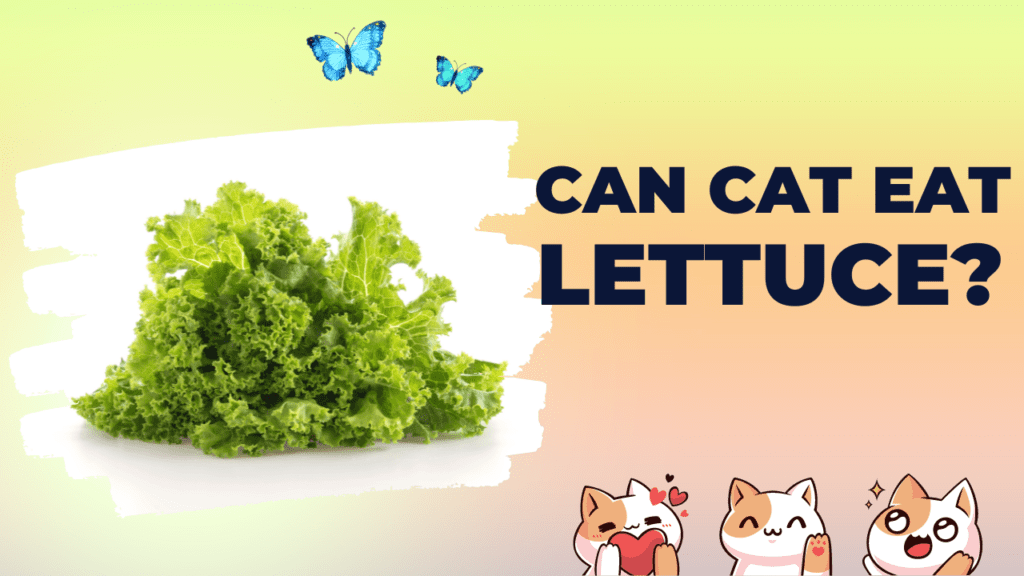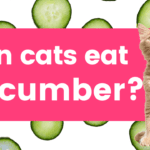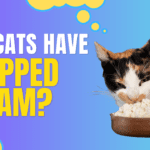Introduction: Feline Nutrition and Dietary Curiosity
Cats are known for being very interested, especially around food. As responsible pet owners, it’s important to make sure our feline friends get a healthy, balanced diet that helps their general health and well-being. With the success of natural and fresh foods on the rise, many cat owners wonder if and how safe it is for their furry friends to eat some of the foods we eat. “Can cats eat lettuce?” is a question that comes up often. In this piece, we’ll dig deeper into the topic and look at the possible benefits, risks, and things to think about when cats eat lettuce.

Can Cats Eat Lettuce?
Lettuce is a popular leafy green food, and people often talk about how healthy and nutritious it is. What about cats, though? Can they eat this crunchy green without getting sick? Let’s find out!
Understanding Feline Dietary Needs
Before we talk about whether or not cats can eat lettuce, it’s important to know what they need to eat. Cats are “obligate carnivores,” which means that they can only live on a food that is mostly made up of protein from animals. Their bodies are made in a way that makes it easy for them to digest and absorb nutrients from animal sources. In the wild, cats eat their food in its entirety, including the meat, organs, bones, and sometimes even the fur. These food items provide important nutrients for their health, such as taurine, vitamin A, and arachidonic acid.
Exploring the Nutritional Value of Lettuce
Lettuce has few calories and a lot of water, so it is a good way to stay hydrated and cool off. But when it comes to what cats need to eat, lettuce doesn’t do enough to meet their needs. Some nutrients, like taurine, are only found in animal cells. Plant-based foods, like lettuce, don’t have enough of these nutrients. If a cat eats mostly greens, it might not get enough of some nutrients and have health problems.
Risks and Considerations
Even though celery itself is not dangerous for cats, there are some risks and things to think about before giving it to your cat:
- Digestive Upset: Cats have sensitive digestive systems, and giving them new things can make them sick to their stomachs and make them throw up or have diarrhea. Since lettuce is fibrous and hard to stomach, eating a lot of it can cause these kinds of problems.
- Pesticide Exposure: Pesticides and fertilizers are often used to kill bugs and weeds on lettuce and other leafy greens. If you don’t wash these poisons well, they could hurt your cat’s health. Make sure you wash lettuce really well before giving it to your animal friend.
- Choking Hazard: Lettuce leaves can be tough and hard to chew, which can make it hard for cats to breathe. If you want to give your cat lettuce, you should cut it into small, doable pieces.
- Imbalanced Diet: If lettuce is the main thing a cat eats, it can throw off its nutritional balance. Remember that cats need a food that is high in protein and has certain amino acids, vitamins, and minerals that are best found in animal products.
Frequently Asked Questions About Cats and Lettuce
- Q: Can cats eat lettuce as an occasional treat? A: Lettuce can be a treat when it is given in small amounts. But it should never be a cat’s main source of food. That should always be high-quality cat food made to meet their specific nutritional needs.
- Q: What types of lettuce are safe for cats to eat? A: Small, well-washed portions of romaine lettuce and iceberg lettuce are usually okay for cats to eat. But remember that lettuce should only make up a small part of their food.
- Q: Can cats eat other leafy greens besides lettuce? A: Small amounts of some leafy greens, like spinach and kale, can be good for cats. But it’s important to introduce new foods slowly and keep an eye on your cat to make sure there are no bad effects.
- Q: Are there any benefits to feeding cats lettuce? A: Even though lettuce doesn’t give cats much in the way of nutrition, its high water level can help them stay hydrated. But it’s important to make sure that most of your cat’s drinking needs are met by fresh water.
- Q: How should I prepare lettuce for my cat? A: Wash the lettuce properly to get rid of any dirt, pesticides, or herbicides before giving it to your cat. To reduce choking hazards, chop the lettuce into manageable chunks.
- Q: What are the signs of lettuce intolerance or allergies in cats? A: Different diets can cause different reactions in cats. After consuming lettuce, keep an eye out for any symptoms like vomiting, diarrhea, increased gas, or changes in behavior. If you experience any negative reactions, stop serving lettuce and speak with your veterinarian.
Conclusion: A Balanced Approach to Feline Nutrition
In conclusion, it is important to give considerable thought to the query of whether cats can eat lettuce. Although lettuce is not poisonous to cats, it is also not a necessary component of their diet. Cats are obligate carnivores, which means that their bodies were built to function best on a diet high in animal-based protein. Although lettuce may not offer cats any significant nutritional advantages, its high water content allows it to be given occasionally as a treat or to help cats stay hydrated.
However, it’s crucial to keep in mind that lettuce should never take the place of a cat’s diet’s staples, which should be high-quality cat food tailored to their unique nutritional requirements. Giving them lettuce as a significant component of their food might result in nutritional deficits and imbalances, which can be harmful to their health.
If you do choose to feed your cat lettuce, make sure it has been carefully cleaned to get rid of any dirt, pesticides, or herbicides. To lessen the chance of choking, it’s also crucial to slice the lettuce into manageable portions.
Always keep an eye on how your cat reacts to any new foods you add to their diet. Feeding lettuce should be stopped and further advice should be sought from a veterinarian if you have any negative effects, such as nausea, vomiting, diarrhea, or behavioral problems.
The health of our feline friends should ultimately be our main concern. For their general wellbeing and enjoyment, it is essential to provide a balanced and suitable food. While it may be alluring to feed our cats various human meals, it’s crucial to keep in mind that they have different nutritional requirements. Always seek assistance from a veterinarian who can offer specialized guidance based on your cat’s unique needs if you have any worries or inquiries about your cat’s nutrition.
Disclaimer:
At TheCatCare.org, we take great care to ensure that the information we provide is accurate, up-to-date, and reliable. However, it’s important to note that we are not medical advisors or licensed veterinarians, and the information we provide should not be considered a substitute for professional advice.

Franky Watson is a certified pet care specialist with over 10 years of experience working with animals of all kinds. He has a degree in veterinary science and is passionate about educating pet owners on how to provide the best possible care for their furry friends. In addition to writing articles on pet care topics, Franky Watson also volunteers at local animal shelters and fosters animals in need. When he’s not caring for animals, he enjoys hiking and spending time with her own pets, including two cats.




